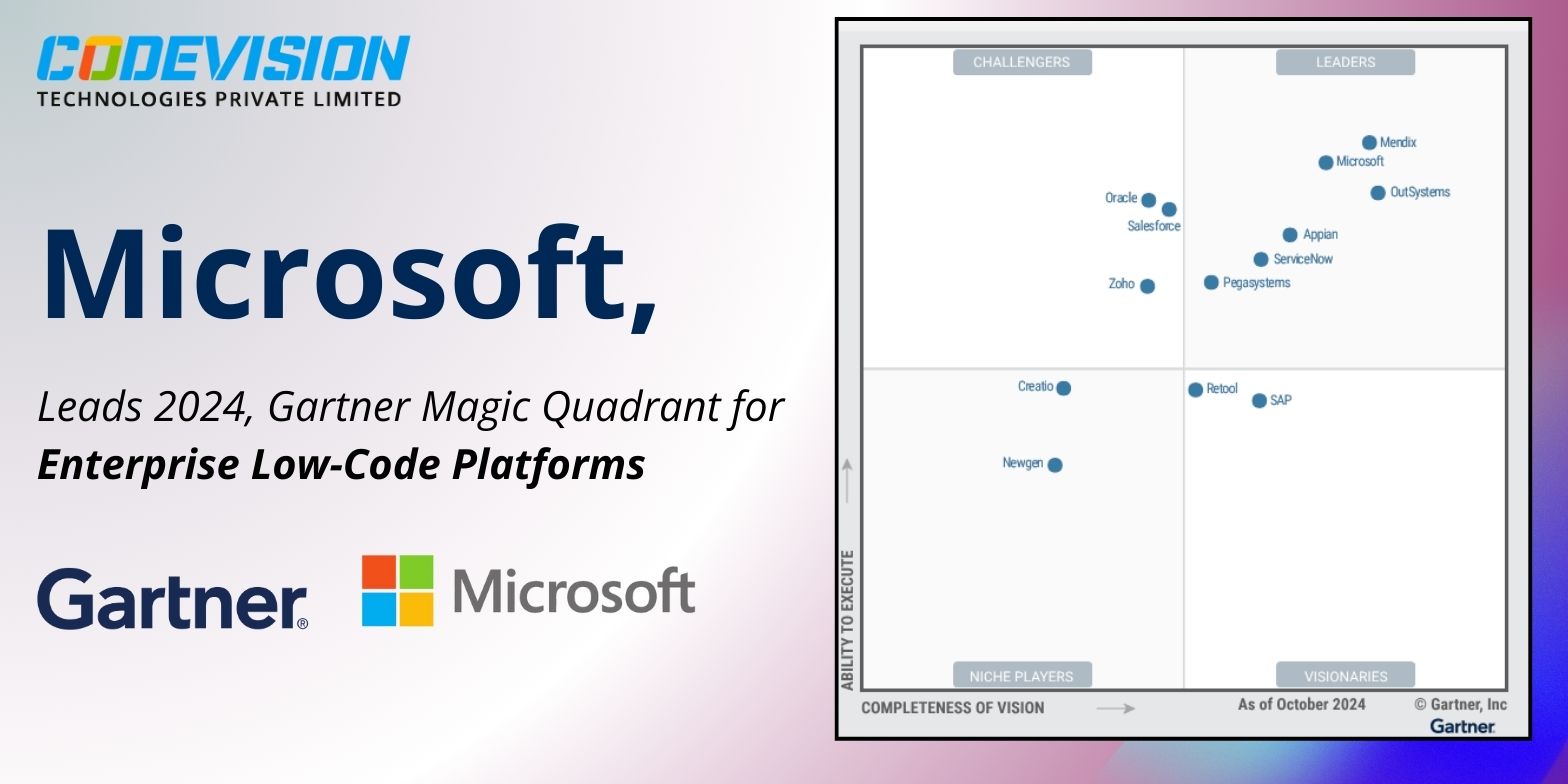Microsoft Leads 2024 Gartner Magic Quadrant for Enterprise Low-Code Platforms

Introduction:
In today’s fast-paced digital landscape, low-code and no-code platforms have become essential tools for organizations seeking to innovate and adapt swiftly. Microsoft has been recognized as a leader in the 2024 Gartner Magic Quadrant for Enterprise Low-Code Platforms, highlighting the significance of these solutions. As businesses increasingly recognize the need for rapid application development and digital transformation, Enterprise Low-Code Application Platforms are gaining momentum. By enabling users to create applications without extensive coding expertise, these platforms empower organizations to streamline processes, enhance efficiency, and respond agilely to market demands
Understanding Concept of Low-Code/No-Code Platforms
Definition of Low-Code and No-Code Platforms
Low-code platforms provide a visual development environment where users can create applications with minimal hand-coding. In contrast, no-code platforms enable users to build applications without any coding at all, relying solely on visual interfaces.
Benefits of Using Low-Code/No-Code Solutions
- Faster Development Cycles: By simplifying the development process, these platforms significantly reduce the time it takes to build and deploy applications, allowing businesses to respond quickly to changes in the market.
- Reduced Dependency on IT Teams: Non-technical users can take charge of their custom application development, freeing up IT teams to focus on more complex projects and innovations.
- Cost-Effective and Scalable Solutions: Low-code/no-code platforms offer cost-efficient development options, making it easier for organizations of all sizes to scale their operations as needed.
- Empowerment of Non-Technical Users: These platforms democratize app development, enabling individuals with limited technical expertise to create custom solutions tailored to their specific needs.
Top 5 Low-Code/No-Code Platforms
1. Microsoft Power Apps
- Microsoft Power Apps stands out with its extensive integration capabilities within the Microsoft ecosystem. Key features include:
- Integration with Microsoft 365, Azure, and Dynamics 365: Seamlessly connect with tools already in use, enhancing workflow efficiency.
- User-Friendly Design and Powerful Data Connectors: Its intuitive interface allows users to create applications quickly, supported by a wide range of data connectors.
2. OutSystems:
- OutSystems is renowned for its scalability and robustness, making it a prime choice for enterprise application development.
- Key Strengths in Enterprise Application Development: Focused on building applications that can grow with your organization, it supports complex workflows and integrations.
3. Mendix:
- Mendix caters to both no-code and low-code users, offering unique features such as:
- Cloud-Native Architecture and Collaborative Tools: Its design promotes teamwork among developers and stakeholders, fostering innovation.
4. Appian:
- Appian is known for its emphasis on workflow automation and intelligent automation through AI and machine learning.
- Integration of AI for Enhanced Processes: Organizations can automate repetitive tasks and improve efficiency through intelligent workflows.
5. Zoho Creator
- Zoho Creator excels in simplicity and ease of integration, making it ideal for smaller applications.
- Integration with Existing Zoho Services: It provides a streamlined solution for businesses already using Zoho’s suite of products.
Why Choose Power Apps for Your Organization or Community?
Integration Capabilities:
- Power Apps can seamlessly integrate with various Microsoft products, including Excel, Teams, and SharePoint. This compatibility enables users to connect with over 500 data sources and third-party services, enhancing data-driven decision-making.
User-Friendly Interface:
- Power Apps features drag-and-drop functionality that empowers even non-technical users to create their own custom apps. With pre-built templates and components, organizations can facilitate their development processes.
Cost-Effective and Scalable:
- The flexible pricing models of Power Apps cater to organizations of all sizes. As your organization or community expands, Power Apps can scale alongside it, ensuring continued support for your business growth.
Enhanced Security and Compliance:
- As part of the Microsoft ecosystem, Power Apps includes built-in compliance and security features. Users benefit from data protection, encryption, and adherence to GDPR compliance standards.
Community Support and Learning Resources:
- Power Apps users have access to extensive learning resources, training programs, and a vibrant community. Microsoft’s forums, tutorials, and Power Platform events provide ongoing support for users at all experience levels.
Use Cases of Microsoft Power Apps
Organizations and communities are leveraging Power Apps in various ways, including:
Automating Manual Processes: Streamlining operations such as expense approvals and inventory management to reduce time and errors.
Building Custom Dashboards: Creating tailored dashboards for tracking key performance indicators (KPIs), enhancing visibility and accountability.
Enhancing Field Operations: Developing mobile-friendly solutions to improve field operations, allowing employees to access information on the go.
Improving Employee Engagement: Designing custom apps that cater to the unique needs of employees, boosting productivity and engagement.
Conclusion
The benefits of adopting low-code/no-code platforms are undeniable, especially in today’s fast-paced business environment. Among the top options available, Microsoft Power Apps stands out as an ideal choice for organizations, particularly those already invested in the Microsoft ecosystem. With its robust integration capabilities, user-friendly interface, and strong community support, Power Apps can significantly enhance your custom application development process.
According to a recent announcement, Microsoft was named a leader in the 2024 Gartner Magic Quadrant for Enterprise Low-Code Application Platforms, further underscoring its commitment to empowering organizations through innovative solutionsto explore the capabilities of Microsoft Power Apps for your organization or community? Start your journey toward efficient app development today! Reach out to Codevision Technologies for expert guidance and support in leveraging Power Apps to transform your digital landscape.

